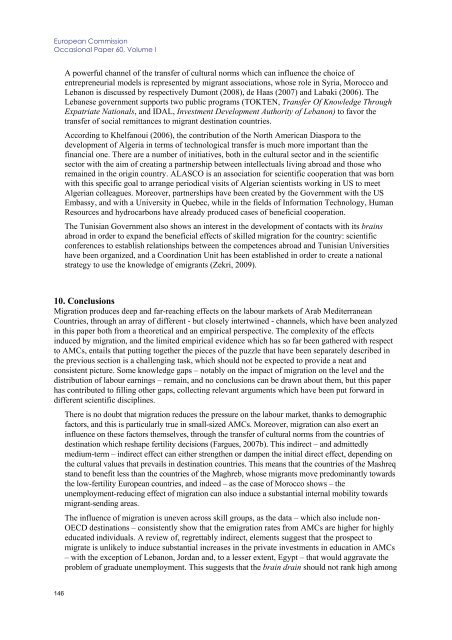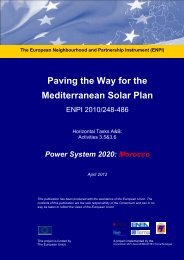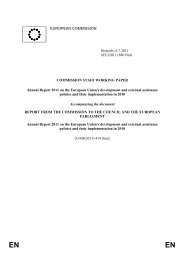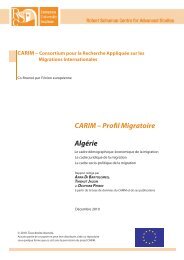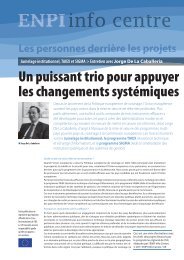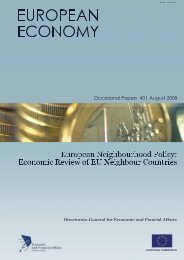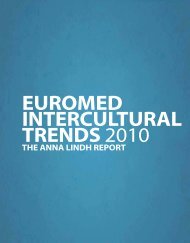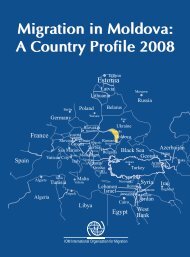<strong>European</strong> CommissionOccasional Paper 60, Volume IA powerful channel of the transfer of cultural norms which can influence the choice ofentrepreneurial models is represented by migrant associations, whose role in Syria, Morocco <strong>and</strong>Lebanon is discussed by respectively Dumont (2008), de Haas (2007) <strong>and</strong> Labaki (2006). TheLebanese government supports two public programs (TOKTEN, Transfer Of Knowledge ThroughExpatriate Nationals, <strong>and</strong> IDAL, Investment Development Authority of Lebanon) to favor thetransfer of social remittances to migrant destination countries.According to Khelfanoui (2006), the contribution of the North American Diaspora to thedevelopment of Algeria in terms of technological transfer is much more important than thefinancial one. There are a number of initiatives, both in the cultural sector <strong>and</strong> in the scientificsector with the aim of creating a partnership between intellectuals living abroad <strong>and</strong> those whoremained in the origin country. ALASCO is an association for scientific cooperation that was bornwith this specific goal to arrange periodical visits of Algerian scientists working in US to meetAlgerian colleagues. Moreover, partnerships have been created by the Government with the USEmbassy, <strong>and</strong> with a University in Quebec, while in the fields of Information Technology, HumanResources <strong>and</strong> hydrocarbons have already produced cases of beneficial cooperation.The Tunisian Government also shows an interest in the development of contacts with its brainsabroad in order to exp<strong>and</strong> the beneficial effects of skilled <strong>migration</strong> for the country: scientificconferences to establish relationships between the competences abroad <strong>and</strong> Tunisian Universitieshave been organized, <strong>and</strong> a Coordination Unit has been established in order to create a nationalstrategy to use the knowledge of emigrants (Zekri, 2009).10. ConclusionsMigration produces deep <strong>and</strong> far-reaching effects on the labour <strong>market</strong>s of Arab MediterraneanCountries, through an array of different - but closely intertwined - channels, which have been analyzedin this paper both from a theoretical <strong>and</strong> an empirical perspective. The complexity of the effectsinduced by <strong>migration</strong>, <strong>and</strong> the limited empirical evidence which has so far been gathered with respectto AMCs, entails that putting together the pieces of the puzzle that have been separately described inthe previous section is a challenging task, which should not be expected to provide a neat <strong>and</strong>consistent picture. Some knowledge gaps – notably on the impact of <strong>migration</strong> on the level <strong>and</strong> thedistribution of labour earnings – remain, <strong>and</strong> no conclusions can be drawn about them, but this paperhas contributed to filling other gaps, collecting relevant arguments which have been put forward indifferent scientific disciplines.There is no doubt that <strong>migration</strong> reduces the pressure on the labour <strong>market</strong>, thanks to demographicfactors, <strong>and</strong> this is particularly true in small-sized AMCs. Moreover, <strong>migration</strong> can also exert aninfluence on these factors themselves, through the transfer of cultural norms from the countries ofdestination which reshape fertility decisions (Fargues, 2007b). This indirect – <strong>and</strong> admittedlymedium-term – indirect effect can either strengthen or dampen the initial direct effect, depending onthe cultural values that prevails in destination countries. This means that the countries of the Mashreqst<strong>and</strong> to benefit less than the countries of the Maghreb, whose migrants move predominantly towardsthe low-fertility <strong>European</strong> countries, <strong>and</strong> indeed – as the case of Morocco shows – theunemployment-reducing effect of <strong>migration</strong> can also induce a substantial internal mobility towardsmigrant-sending areas.The influence of <strong>migration</strong> is uneven across skill groups, as the data – which also include non-OECD destinations – consistently show that the e<strong>migration</strong> rates from AMCs are higher for highlyeducated individuals. A review of, regrettably indirect, elements suggest that the prospect tomigrate is unlikely to induce substantial increases in the private investments in education in AMCs– with the exception of Lebanon, Jordan <strong>and</strong>, to a lesser extent, Egypt – that would aggravate theproblem of graduate unemployment. This suggests that the brain drain should not rank high among146
Chapter IIThe impact of <strong>migration</strong> on labour <strong>market</strong>s in Arab Mediterranean countriesthe concerns of AMCs, which face notable difficulties in providing adequate employmentopportunities to their most talented workers.The reduction in unemployment is not just mechanically due to the reduction in the labour supply,but also to the influence that <strong>migration</strong> exerts on the behavior of the working-age population.Young individuals from AMCs who have access to <strong>migration</strong> networks have a higher propensity tomigrate than the rest of the population, <strong>and</strong> this reduces their incentives to actively seek a low-paiddomestic occupation. They devote their efforts, instead, to arranging their own <strong>migration</strong> project.The theoretical <strong>and</strong> empirical arguments revised in this paper cast serious doubts on the idea that<strong>migration</strong> can positively influence female participation in the labour <strong>market</strong>, which is notably lowin AMCs. Migration, which is predominantly male, directly increases the dem<strong>and</strong> for female labourin households with family-run economic activities, as this kind of job encounters a weaker culturalresistance – which can also be reinforced through the transfer of social remittances from destinationcountries –than waged female employment (Ennaji <strong>and</strong> Sadiqi, 2008). The dem<strong>and</strong> for femaleemployment within family-run economic activities can also be increased if migrant remittances areused to finance small-scale productive investments, while the effect of remittances on theincentives to seek out waged employment are reduced by the positive income effect they bringabout. Furthermore, the opportunities to work outside the household is also constrained by the needto take care of the children left behind with the wife of the migrant. Though a woman may getsome support for the care of the children from her relatives, this choice could further reduce hersearch for a job which is perceived as being detrimental to the social status of the family. Thismeans that <strong>migration</strong> out of AMCs has, in the short-run, a limited positive – <strong>and</strong> possibly evennegative – effect on female participation on the labour <strong>market</strong>, which is mostly produced withinfamily-run economic activities. Things may change in the medium to long term, provided thatsocial remittances contribute to reduce social resistance towards active female engagement in thelabour <strong>market</strong>.The labour <strong>market</strong>s of AMCs also respond to the effects that <strong>migration</strong> produces on their dem<strong>and</strong>side, <strong>and</strong> the available evidence on the influence of <strong>migration</strong> on the patterns of consumptionsuggests that a non-negligible part of the dem<strong>and</strong> stimulus brought about by migrant remittancesleaks out towards foreign-produced goods – especially for the smaller countries with a limitedmanufacturing sector, while the domestic job-creation effect is predominantly limited to low-skilledoccupations. The dem<strong>and</strong> for real-estate investments systematically experiences a boom in migrantsendingareas, <strong>and</strong> this gives rise to a boom in the construction sector, where new job opportunitiesemerge. Though this partial effect is positive, it should also be considered as revealing of the lack ofopportunities for <strong>migration</strong>-financed productive investments, which could produce a greater <strong>and</strong>longer-lasting effect in term of dem<strong>and</strong> for labour. The evidence on the effects of <strong>migration</strong> – mostlyvia remittances – on investments is limited <strong>and</strong> mostly anecdotal, while evidence on the effect ofreturn <strong>migration</strong> on investments in AMCs, which appeared to be one of the most beneficial effectsof <strong>migration</strong> upon the origin countries, is still limited, <strong>and</strong> controversial. Moreover, return <strong>migration</strong>to the region – <strong>and</strong> most notably to the Mashreq countries – has often been induced by politicalinstability in the countries of destination, so that it has represented a destabilizing factor for thelabour <strong>market</strong> in the origin countries.There are some promising signals that remittances to AMCs are stimulating the deepening of thecredit <strong>and</strong> equity <strong>market</strong>s. This could ease the set-up of new enterprises, which is threatened by anunfavorable institutional <strong>and</strong> economic environment, one of the root causes of <strong>migration</strong>. Wheneconomic <strong>migration</strong> is determined by the scarcity of investment opportunities, rather than by thelack of financial resources to undertake them, then <strong>migration</strong> per se can hardly be expected togenerate these missing opportunities.Though we have been able to advance some tentative conclusions, there are various labour-<strong>market</strong>outcomes that need to be further analyzed before the puzzle of the impact of <strong>migration</strong> on AMCscan be better understood. This paper has laid out a possible analytical framework that could guide147
- Page 5 and 6:
STUDYLABOUR MARKETS PERFORMANCE AND
- Page 7 and 8:
Table of ContentsLABOUR MARKETS PER
- Page 10:
8.1 Actual migration and consumptio
- Page 15 and 16:
Chapter IFinal Report 15 MILLION NE
- Page 17 and 18:
Chapter IFinal Report …so that MI
- Page 19 and 20:
Chapter IFinal Reportroots). The cu
- Page 21 and 22:
Chapter IFinal Report In AMCs, REMI
- Page 23 and 24:
Chapter IFinal Reportpolicies. This
- Page 25 and 26:
Chapter IFinal ReportMediterranean
- Page 27 and 28:
Chapter IFinal ReportMore recently,
- Page 29 and 30:
Chapter IFinal Reportfor EU employm
- Page 31 and 32:
Chapter IFinal Reportchosen, these
- Page 33 and 34:
Chapter IFinal Reportexit of women
- Page 35 and 36:
Chapter IFinal ReportFigure 1.2.1.
- Page 37 and 38:
Chapter IFinal ReportA Declining Em
- Page 39 and 40:
Chapter IFinal ReportThe same year,
- Page 41 and 42:
Chapter IFinal ReportTable 2.2.1. I
- Page 43 and 44:
Chapter IFinal Reportminimum wages
- Page 45 and 46:
Chapter IFinal Report2.4 Unemployme
- Page 47 and 48:
Chapter IFinal ReportYouth Unemploy
- Page 49 and 50:
Chapter IFinal ReportBut one should
- Page 51 and 52:
Chapter IFinal Reportmillion) 10 .
- Page 53 and 54:
Chapter IFinal Reportmight intensif
- Page 55 and 56:
Chapter IFinal Reporttrue labour ma
- Page 57 and 58:
Chapter IFinal Reportto reform the
- Page 59 and 60:
Chapter IFinal ReportFrom a differe
- Page 61 and 62:
Chapter IFinal ReportTable 4.2.1 Ou
- Page 63 and 64:
Chapter IFinal ReportSource: Adams
- Page 65 and 66:
Chapter IFinal Reportin the destina
- Page 67 and 68:
Chapter IFinal ReportIn conclusion,
- Page 69 and 70:
Chapter IFinal Reportorganised in B
- Page 71 and 72:
Chapter IFinal Reportsecond Intifad
- Page 73 and 74:
Chapter IFinal Reportstands at 29.7
- Page 75 and 76:
Chapter IFinal Reportconstruction w
- Page 77 and 78:
Chapter IFinal ReportAs far as the
- Page 79 and 80:
Chapter IFinal Reportother cases, l
- Page 81 and 82:
Chapter IFinal Reportunemployment a
- Page 83 and 84:
Chapter IFinal Reportof Egypt, so f
- Page 85 and 86:
Chapter IFinal ReportWhile progress
- Page 87 and 88:
Chapter IFinal ReportThese reservat
- Page 89 and 90:
Chapter IFinal ReportAs Figure 6.3.
- Page 91 and 92:
Chapter IFinal Reportin skill devel
- Page 93 and 94:
Chapter IFinal ReportThe Directive
- Page 95 and 96:
Chapter IFinal ReportThe need for
- Page 97 and 98: Chapter IFinal Reportobjectives are
- Page 99 and 100: Chapter IFinal Reporttrue Euro-Medi
- Page 101 and 102: Chapter IFinal Report- Putting empl
- Page 103 and 104: Chapter IFinal Report promotion of
- Page 105 and 106: Chapter IFinal ReportOtherADAMS, R.
- Page 107 and 108: Chapter IFinal ReportDE BEL-AIR, F.
- Page 109 and 110: Chapter IFinal ReportGUPTA, S., C.
- Page 111 and 112: Chapter IFinal ReportOECD (2000): M
- Page 113 and 114: Chapter II - Thematic Background Pa
- Page 115 and 116: Chapter IIThe impact of migration o
- Page 117 and 118: Chapter IIThe impact of migration o
- Page 119 and 120: Chapter IIThe impact of migration o
- Page 121 and 122: Chapter IIThe impact of migration o
- Page 123 and 124: Chapter IIThe impact of migration o
- Page 125 and 126: Chapter IIThe impact of migration o
- Page 127 and 128: Chapter IIThe impact of migration o
- Page 129 and 130: Chapter IIThe impact of migration o
- Page 131 and 132: Chapter IIThe impact of migration o
- Page 133 and 134: Chapter IIThe impact of migration o
- Page 135 and 136: Chapter IIThe impact of migration o
- Page 137 and 138: Chapter IIThe impact of migration o
- Page 139 and 140: Chapter IIThe impact of migration o
- Page 141 and 142: Chapter IIThe impact of migration o
- Page 143 and 144: Chapter IIThe impact of migration o
- Page 145 and 146: Chapter IIThe impact of migration o
- Page 147: Chapter IIThe impact of migration o
- Page 151 and 152: Chapter IIThe impact of migration o
- Page 153 and 154: Chapter IIThe impact of migration o
- Page 155 and 156: Chapter IIThe impact of migration o
- Page 157 and 158: Chapter IIThe impact of migration o
- Page 159 and 160: Chapter IIThe impact of migration o
- Page 161 and 162: Chapter III - Thematic Background P
- Page 163 and 164: Chapter IIIEU Migration Policy towa
- Page 165 and 166: Chapter IIIEU Migration Policy towa
- Page 167 and 168: Chapter IIIEU Migration Policy towa
- Page 169 and 170: Chapter IIIEU Migration Policy towa
- Page 171 and 172: Chapter IIIEU Migration Policy towa
- Page 173 and 174: Chapter IIIEU Migration Policy towa
- Page 175 and 176: Chapter IIIEU Migration Policy towa
- Page 177 and 178: Chapter IIIEU Migration Policy towa
- Page 179 and 180: Chapter IIIEU Migration Policy towa
- Page 181 and 182: Chapter IIIEU Migration Policy towa
- Page 183 and 184: Chapter IIIEU Migration Policy towa
- Page 185 and 186: Chapter IIIEU Migration Policy towa
- Page 187 and 188: Chapter IIIEU Migration Policy towa
- Page 189 and 190: Chapter IIIEU Migration Policy towa
- Page 191 and 192: Chapter IIIEU Migration Policy towa
- Page 193 and 194: Chapter IIIEU Migration Policy towa
- Page 195 and 196: Chapter IIIEU Migration Policy towa
- Page 197 and 198: Chapter IIIEU Migration Policy towa
- Page 199 and 200:
Chapter IIIEU Migration Policy towa
- Page 201 and 202:
Chapter IIIEU Migration Policy towa
- Page 203 and 204:
Chapter IIIEU Migration Policy towa
- Page 205 and 206:
Chapter IIIEU Migration Policy towa
- Page 207:
Chapter IIIEU Migration Policy towa


